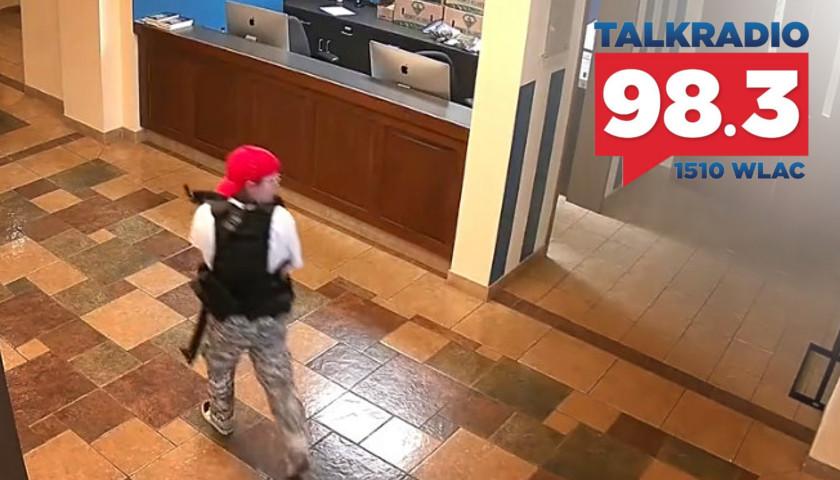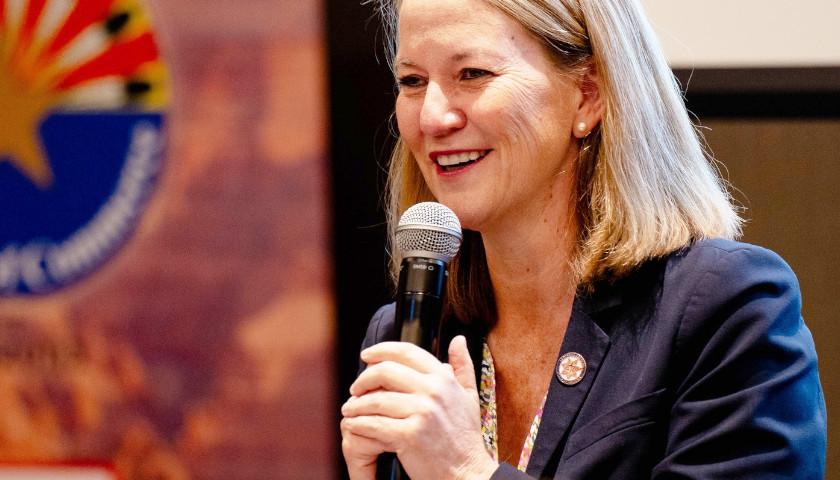Tennessee Coalition for Open Government’s Executive Director Deborah Fisher joined all-star panelist and author Carol Swain in-studio on Thursday’s edition of The Tennessee Star Report with Michael Patrick Leahy to discuss the provisions in current law that would make the Covenant Killer Manifesto available for review by Tennessee lawmakers.
TRANSCRIPT
Michael Patrick Leahy: 7:36 AM – in studio: Dr. Carol Swain, and also the Executive director of the Tennessee Coalition for Open Government, Debra Fisher.
Debra, I have a question for you, and you actually have done a little bit of research on this before, so I know through conversations that a couple members of the Tennessee General Assembly say they have viewed all or part of what’s called the Covenant Killer’s Manifesto.
Audrey Elizabeth Hale left behind a series of writings, journals, et cetera, which collectively are referred to as a manifesto. I, individually, and our company here, Star News Digital Media, The Tennessee Star, we’ve sued the Metro Nashville Police Department to release that document along with several other plaintiffs. They’re contesting it.
In state court it’s a big long mess.
In federal court we’ve asked to have it released – we’ve got another lawsuit going in there. We’re the only plaintiff in that.
The manifesto exists in the Metro National Police Department, the Federal Bureau of Investigation, and the Tennessee Bureau of Investigation.
Now, I’ve had a couple people say to me, ‘Well, why are only a few of the state legislators been able to see this manifesto since the special session is purportedly to come up with ideas to improve, ‘public safety,’ but it was caused by the covenant killings on March 27th?’
Now, the question that I have – and then I went to a press conference where one of the journalists said, ‘Well, the legislators have a law that would let them see it all.’
Can you elaborate on this? Because if you talk to most of the members of the Tennessee General Assembly right now, they have no idea that there’s a mechanism for them to see this manifesto, explain this to us.
Deborah Fisher: Right.
So, in general, TBI records are confidential, but there is an exception to that exception that says – and I’ll just read it: “that such investigative records of the TBI shall be open to inspection by elected members of the general assembly, if such inspection is directed by a duly adopted resolution of either house, or of a standing or joint committee of either house, or if such inspection is directed by a majority vote of the entire membership of an ad hoc committee appointed specifically to study unsolved civil rights crimes,” and it goes on related to that – “investigation about civil rights crimes.”
But basically, they can adopt a resolution – either house or a joint committee can adopt a resolution to be able to see those records.
Michael Patrick Leahy: Is it a joint committee or could any committee adopt it?
Deborah Fisher: “Either House or of a standing or a joint committee.”
Michael Patrick Leahy: “Standing committee.”
So any committee.
Deborah Fisher: That’s right.
Michael Patrick Leahy: Any committee chairman today, if you’re listening, if you’re in the Tennessee General Assembly and you want to see the Covenant Killer Manifesto and as a first order of business, you could convene your committee, you could take a vote and and say, ‘We want to have authorization for the entire Tennessee General Assembly to see the Covenant Killer Manifesto’ and TBI would have to release it to them, right?
That’s correct. Carol, you’re looking like you wanna say something about this.
Carol Swain: Well, I just think it’s so interesting that the more they block access to the manifesto, the more the world wants to see it. They have not figured that out.
Michael Patrick Leahy: And most of the Covenant parents, the Covenant School, the Covenant Church are adamantly opposed to this.
Carol Swain: But do you know about all the covenant parents?
We just know about the group that has the influence?
Michael Patrick Leahy: The majority do. We’ve looked into it – it’s a majority.
There are some that don’t, but let me come back to this point and to our Tennessee General Assembly members right now. Okay. And I know that most of them are not aware that they have this authority to see it.
Carol Swain: Well, what is the argument that they have that would justify their being able to block public access to the manifesto?
Michael Patrick Leahy: they’ve made numerous arguments that aren’t, to me, Deborah, the arguments do not meet the standard of Tennessee statutes, right?
Would you agree with that?
Deborah Fisher: Well, I agree, but it’s in court.
Michael Patrick Leahy: It’s in court.
Deborah Fisher: And so we’re hoping the judges agree.
Michael Patrick Leahy: And they may not. But let’s get back to this point.
If you’re a member of the Tennessee General Assembly right now, and you’re thinking, ‘What am I gonna do on Monday when this thing convenes?’ and you say, ‘We can’t address this until we have the manifesto.’
If you’re the chairman of a committee, you can hold a hearing in your committee and you can pass a motion there or a resolution just in your committee and say, ‘We wanna see the manifesto.’ You’d have to see it under law. So that’s one message.
And I – again Debra, although a few members of the Tennessee General Assembly say they’ve seen it, I think the vast majority have no idea that they even have a right to see it, and they have a mechanism for doing it.
Now, as to related to the next step here, Debra, what I would recommend – see what you feel about this – I think in terms of if you want to deal with public safety the next resolution to pass would be to, to modify section 10-7504, which you just read about from the Tennessee code annotated and say, ‘not only can we see it, we can make it public.’
For the state legislators, they could do that very easily.
Your thoughts on the wisdom of that, Debra Fisher.
Deborah Fisher: Well, I think if they’re going to pass legislation based on something that they find in an investigative file, it would be helpful if that information that they found would be public. Now, nothing in the statute says they can’t talk about it, but it does say in the current statute that “any record inspected pursuant to this exception, shall maintain its confidentiality throughout the inspection.”
So, but I don’t think anything would prevent them from saying what’s in there. Still, the record, itself.
If they think it’s important enough to pass legislation, then it should be important enough to share.
Michael Patrick Leahy: Carol, many Tennessee General Assembly members listen to you. Would you advise them to go in and as the first order of business, first, tell the TBI that they wanna see the document and then secondly, change the law so that if they see the document, they can release it to the public.
Your thoughts, Carol Swain.
Carol Swain: It should certainly be released to the public and unfortunately, if we were dealing with Democrats, it would’ve already been leaked to The New York Times.
Michael Patrick Leahy: I can say for a fact that no one has leaked the Covenant Killer Manifesto to The Tennessee Star.
Carol Swain: And you probably would not have published it if they had leaked it because for the most part, Republicans tend to be more principled, more law abiding.
Michael Patrick Leahy: Well, if we got a leaked copy of it, we wouldn’t release it because there would be questions as to the legality of our obtaining it.
Carol Swain: But I also have another question. Of the legislators that have actually read the manifesto, have you spoken with any of them and do they believe that the content is something that the public needs to see?
Michael Patrick Leahy: Well, I’ll give you two comments on that. First, they’re very circumspect about what’s in it. So they don’t comment on it.
So they’ve maintained confidentiality. But I will tell you that there’s apparently a member of the City Council, Metro Council here who’s either seen it or says the police officers have seen it and has said that it is so incendiary it can’t be released.
Carol Swain: Oh my.
Michael Patrick Leahy: Yeah. So anyways, when we get back, it’ll be time for News Potpourri.
This is The Tennessee Star Report. I’m Michael Patrick Leahy.
We’ll be back after this.
– – –
Tune in weekdays from 5:00 – 8:00 a.m. to The Tennessee Star Report with Michael Patrick Leahy on Talk Radio 98.3 FM WLAC 1510. Listen online at iHeart Radio or Spotify.
Photo “Covenant Security Camera Footage” by Metro Nashville Police Department.




